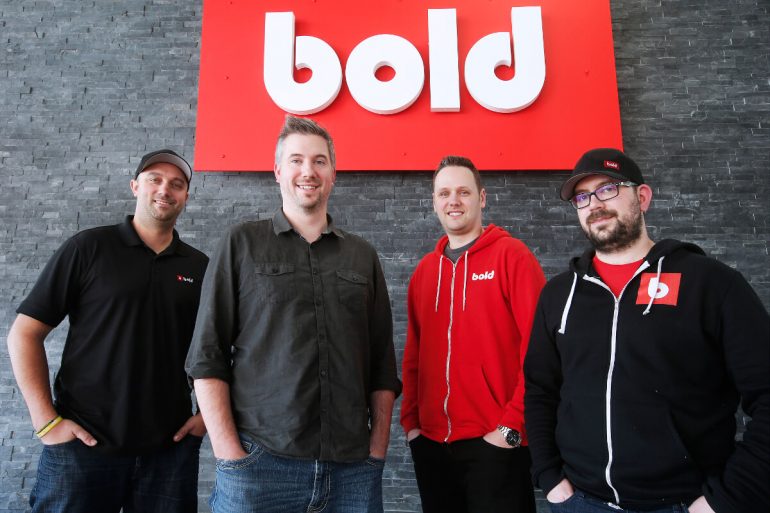Winnipeg-based e-commerce solution developer Bold Commerce announced today the close of a $22 million CAD Series A funding round, led by Whitecap Venture Partners and Round13 Capital. As part of the funding, Whitecap’s Carey Diamond and Round13’s Craig Strong will join Bold’s board of directors.
The number Bold has raised is a staggering first-time funding total, particularly for a software development company. But with over 20 applications, 275 employees, and 86,000 merchants using its software, the previously bootstrapped e-commerce developer has built an infrastructure and business model primed for growth.
To become the middleware solutions provider for all e-commerce not found on Amazon, Bold Commerce needed a VC cash injection.
Bold Commerce builds apps for e-commerce platforms. Previously, that had simply meant Shopify (TechCrunch once referred to the company as Shopify’s largest app developer and Bold CEO and co-founder Yvan Boisjoli confirmed that’s still the case), but the company recently started supporting competitor BigCommerce. Merchants on each platform can grab apps individually for specific utilities (e.g. subscriptions or multi-currency support) or in pre-set bundles. Bold also offers managed services for merchants, and Boisjoli indicated that the company’s customer base has grown in complexity along with Shopify’s growth, with a newfound focus on enterprise.
“We started with Shopify and we’re growing with Shopify,” he said. “We were there when Shopify only had mom-and-pops, and we were part of Shopify’s transition to Plus as well. I would say that any size customer Shopify has, we have.”
On top of Bold’s managed service fees, each app, whether sold alone or in a bundle, has its own pricing model. Some may be feature gated by specific pricing tiers, or scale monthly cost by users, or take a transaction fee. This allows each Bold Commerce app and service to be available to the smallest online merchant, but allows Bold to maximize its profit from every customer based upon the merchant’s size and level of activity: the more a merchant uses an app, the more money Bold makes; the more apps a merchant uses, the more money Bold makes.
The dynamic pricing and network effects separate Bold Commerce from most software developers, and are what made the company so enticing to investors. Speaking with Craig Strong, he told BetaKit that Round13’s investment in Bold was the VC firm’s largest cheque cut to date.
“There are two big chunks,” Strong told BetaKit. “One is recurring revenue through selling any one of their 20 e-commerce apps. The other piece, and where I think this starts to get extremely big, is payments processing. A lot of companies are doing that now, but you can imagine if they get a couple of basis points on every transaction that goes through the platforms they support, they’ll do significantly well at scale.”
“Then we look at their distribution opportunities and that starts to get us really excited.”

Expansions to e-commerce platforms beyond Shopify and BigCommerce should be expected in 2019, and the company is currently working to support crowdfunding and transactions on streaming platforms like Twitch. But to become the middleware solutions provider for all e-commerce not found on Amazon, Bold needed that VC cash injection. With that comes an expected staff doubling over the next eighteen months (Boisjoli is committed to growing in Winnipeg but also said the company is exploring options to ensure it can meet its growth pace).
The CEO also said Bold Commerce will invest in developing AI-based solutions, which is something that every company that raises funding in 2019 will say, but Boisjoli actually has a pretty good reason: headless commerce. You’ve likely never heard the term, but it refers to a movement that separates the retail purchase process from the traditional point of purchase. Whereas you previously had the physical store and the digital store, now there are just channels – whether it’s your Alexa, your fridge, or your Twitch stream – and few will look like a traditional store.
“What’s happening is you’re starting to see these new channels emerge and you need to have a solution that ties these channels together,” Boisjoli said. “I think we’re in an interesting situation where we can provide really complex solutions in a way that is headless, so merchants can manage their e-commerce experience regardless of channel.”
The work to integrate all these newfound sales channels agnostically, and automate them in a way that doesn’t overload merchants, is significant. But so is the opportunity for Bold if the company can build a tech stack that supports any merchant sale regardless of how the customer chose to buy it.
Strong wouldn’t go so far as to call Bold Commerce Canada’s next e-commerce darling, but the VC’s excitement was palpable.
“We see Bold as the future of e-commerce. That’s the thing that excited us. It’s easy to imagine a world where everyone is buying in their own particular way, and Bold benefits from all of those purchases, regardless of the starting point.”

